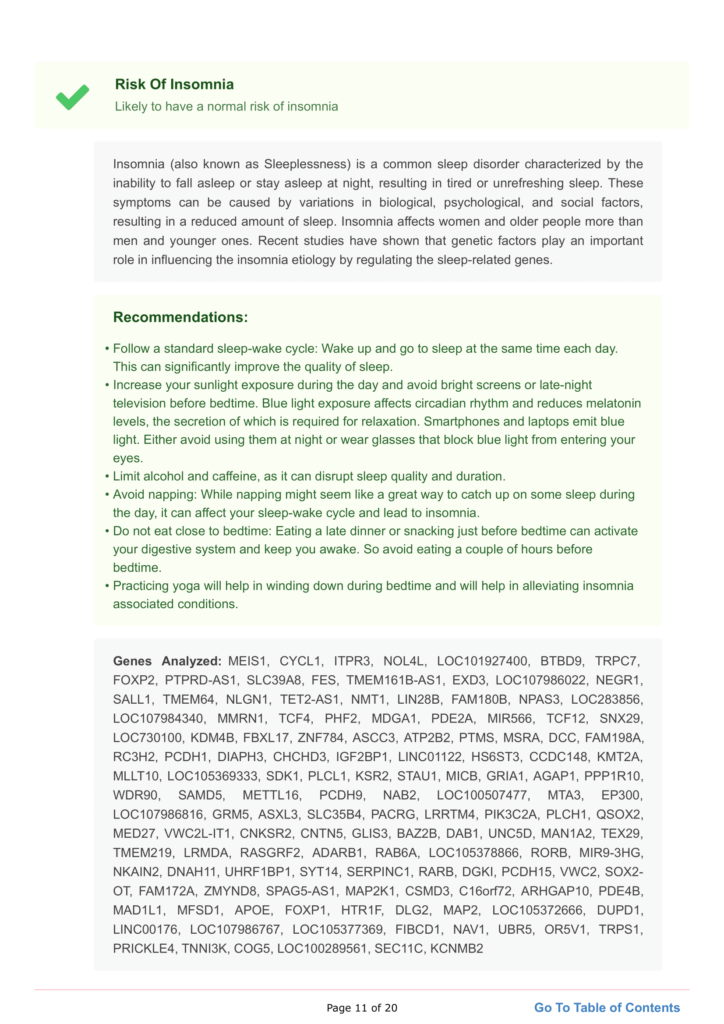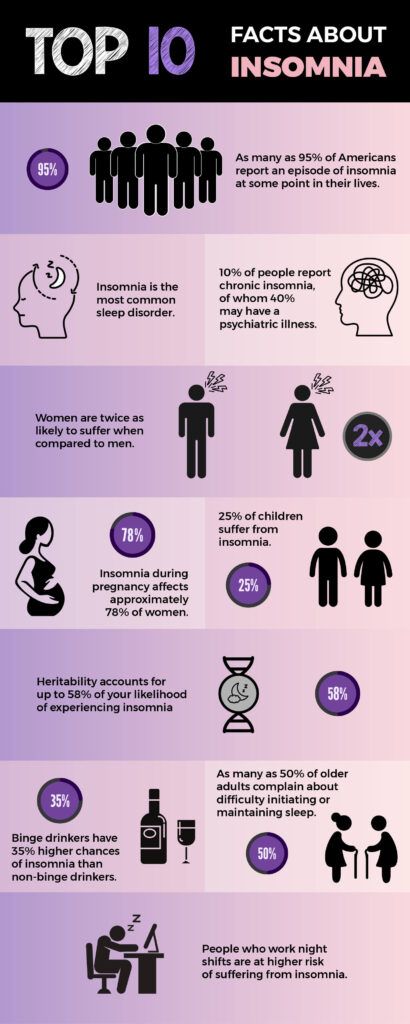Genetic Insomnia Report
Is insomnia genetic? According to the Sleep Foundation, the heritability of insomnia is 31-58%, indicating a strong genetic component to insomnia.
In the sample report below, we've attempted to analyze some important genes that increase the risk for insomnia.
You can identify your genetic risk of insomnia by using your 23andMe DNA data and placing an order for the Gene Sleep Report.

What is Insomnia?
Insomnia (also known as sleeplessness) is a common sleep disorder that is characterized by the inability to fall asleep or stay asleep at night, resulting in tired or unrefreshing sleep.
According to the American Psychiatric Association (APA), insomnia is the most common sleeping disorder.
Approximately 30% to 40% of adults in the United States report symptoms of insomnia.
A diagnosis of insomnia needs to meet the following two categories:
- Difficulties in sleep for at least three nights a week for a minimum of three months
- Difficulties in sleep that result in functional distress in the individual’s life
This can be caused by variations in biological, psychological, and social factors, which most often result in a reduced amount of sleep.
Genetic Influences on Sleep-related Traits
Is Insomnia Genetic?
People with parents or siblings with insomnia have an increased risk of experiencing the condition themselves. This indicates a genetic link to insomnia.
This was further confirmed by a 2018 study that reported that insomnia has a partially heritable basis. In fact, heritability accounts for 31% to 58% of your insomnia risk.
Insomnia also appears to share genetic links with other health conditions.
The researchers also found a strong genetic link between insomnia and type 2 diabetes.
Tissue-specific gene-set analyses showed that insomnia might have higher genetic signals among genes that are usually expressed in the brain.
The functions of these regions of the brain are of relevance to insomnia.
The genetic correlations between insomnia and psychiatric traits were stronger than the genetic correlations between insomnia and other sleep-based characteristics.
The study suggests that, genetically, insomnia resembles neuropsychiatric traits more closely than other sleep-related characteristics.
MEIS1 Gene and Insomnia
The MEIS1 gene is a transcription factor that plays a key role in hematopoiesis, endothelial cell development, and vascular patterning.
It also plays a role in neurodevelopment.
Research studies have shown that the reduced MEIS1 levels and function of the gene may contribute to the pathogenesis of sleep-related disorders.
rs113851554 And Insomnia Risk
The rs113851554 is a G>T polymorphism located in the MEIS1 gene, which is found to be correlated with multiple sleep disorders.
A study found that the T allele of rs113851554 is associated with an increased risk of developing insomnia symptoms.
Functional study analysis suggested that the rs113851554 in the MEIS1 locus is most strongly associated with insomnia disorder.
Current Research on Is Insomnia Genetic - 2022 Updated
A July 2022 study published in Nature Genetics attempted to discover new genetic loci (specific regions in the gene) associated with insomnia.
This was a robust study since it included nearly 600,000 cases and 1.8 million controls.
The study identified 554 risk loci, out of which 364 loci were novel, associated with insomnia.
It also prioritized 289 genes that could help understand the underlying mechanisms of insomnia.
Get Your Insomnia Genetic Report
Other Risk Factors for Insomnia
Insomnia is more common in women than in men.
More than one in four women in the United States experience insomnia, compared with fewer than one in five men.
Insomnia is more common in older people than in younger ones.
As many as 50% of older adults complain about difficulty initiating or maintaining sleep.
Medical and psychiatric conditions can increase insomnia risk.
Insomnia is more commonly seen in those with heart disease, asthma, depression, and anxiety than their healthier counterparts.
Effects Of Insomnia On Health
- Increased risk of heart disease, stroke, inflammation, obesity, seizures, diabetes, and asthma
- Increased risk of anxiety and depression
- A negative impact on your memory
- Harder to concentrate and be productive during the day
- More prone to falling and accidents by affecting your balance
- Lowered life expectancy
Tips To Prevent And Manage Insomnia
- Having a consistent bed time can help stabilize your sleep cycle, making it easier to fall asleep.
- Frequency daytime naps can result in difficulties falling asleep at night.
- Experts recommend waiting at least three hours after you've eaten to go to bed.
- Daily physical activity can help with energy expenditure, improving both sleep onset time and sleep quality.
- Stress management through meditation, yoga, and therapy can help calm your mind and prepare it for a restful night of sleep.
- If lifestyle changes don’t fix your insomnia, seeking professional help can help you sleep better.
Summary
- Insomnia is the most common sleeping disorder and describes the inability to fall asleep or stay asleep at night.
- Insomnia can be caused by variations in biological, psychological, and social factors, resulting in a reduced amount of sleep.
- Over 300 genes have been identifed in association with insomnia. The MEIS1 gene has one of the strongest associations with insomnia and is known to contribute to the pathogenesis of sleep-related disorders.
- Sticking to a proper routine, exercising, avoiding many day time naps, stress management, and seeking professional help can help treat and manage insomnia.
References
https://pubmed.ncbi.nlm.nih.gov/30804565/
https://pubmed.ncbi.nlm.nih.gov/26132482/







